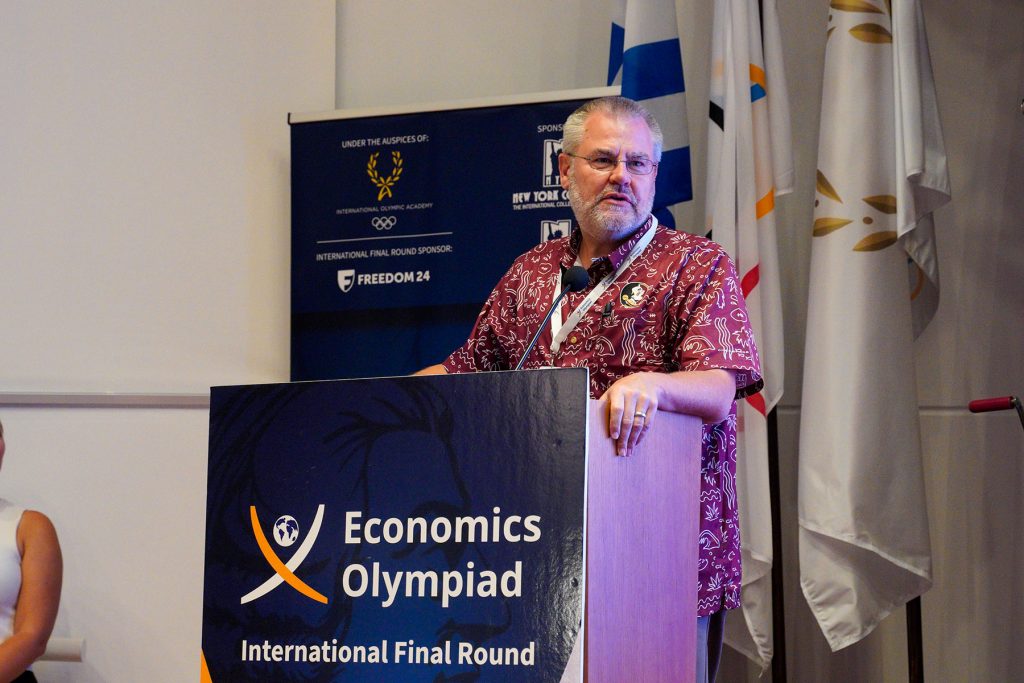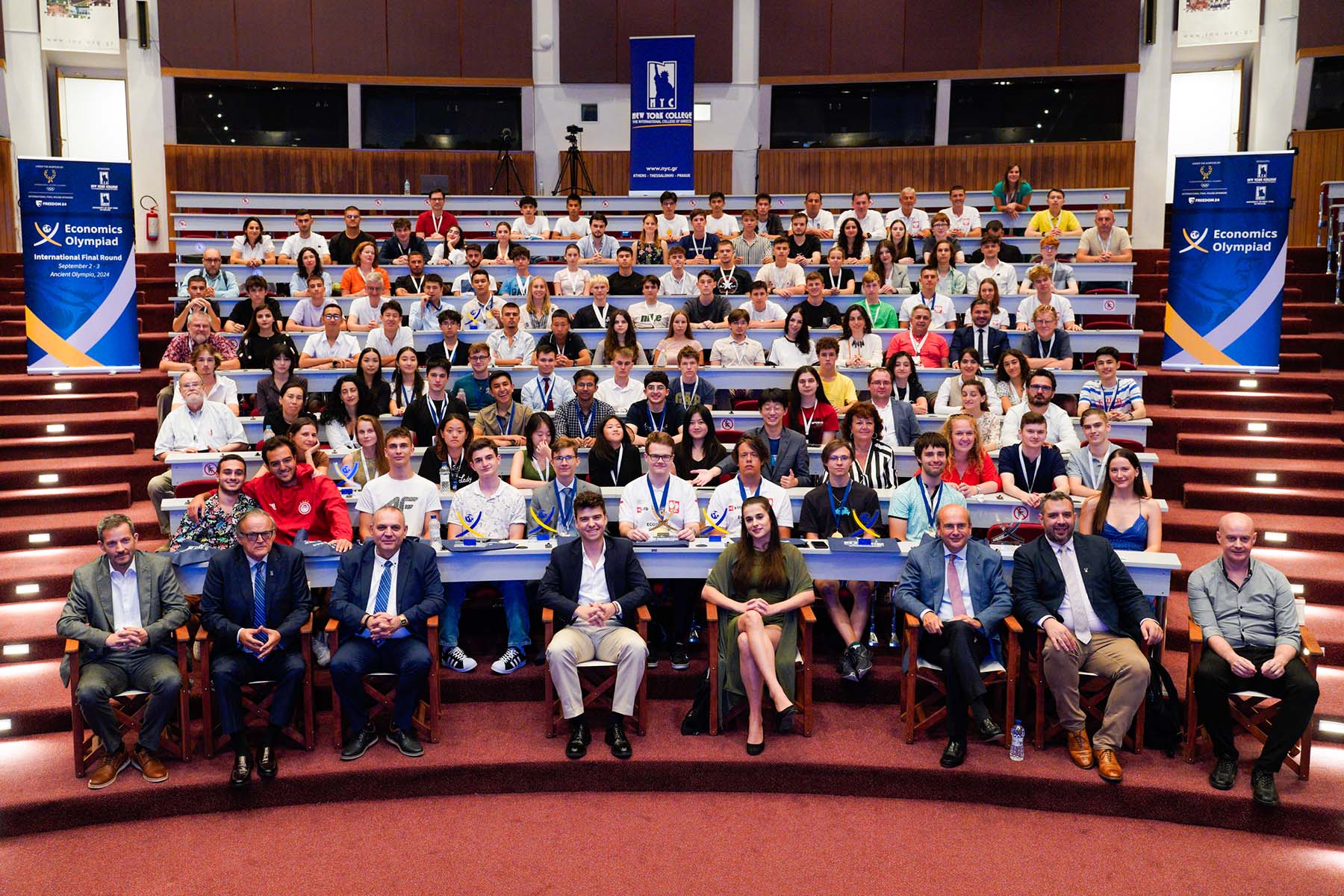How FSU’s Stavros Center is distributing economics education around the world

The study of economics transcends language and geographic barriers across the world, as individuals rely on its teachings to make better choices and live a more satisfying life.
At Florida State University, the Gus A. Stavros Center for the Advancement of Free Enterprise and Economic Education is leading multiple efforts to provide quality economics education on campus and around the world.
The Stavros Center was founded in 1988 through a generous endowment from Gus Stavros and his wife, Frances. The son of Greek immigrants, Stavros created the center with the mission to further free enterprise and extend economics education in schools and the broader community.
Joseph Calhoun, a teaching professor and director of the Stavros Center, is fulfilling that mission statement in several different ways.
“There is no physical limit to how that mission is achieved,” Calhoun said. “Regardless of where the teacher is, if they have anything to do with economics, personal finance or entrepreneurship, it falls within our mission to reach them. From Eastern Europe or just down the road here at a high school, the center can help them. International outreach is something that is very consistent with Gus Stavros’ mission for the center and something he would have loved.”
With a career spanning more than 21 years, Calhoun has taught many upper-division economics and personal finance courses at FSU. He also created the Unconquered by Debt Program, which helps enhance financial literacy among students through online resources and peer mentor workshops.
Calhoun has experience teaching abroad at all three of FSU’s European study centers through International Programs — twice at FSU Florence and FSU Valencia and once at FSU London.
“You try to show students, locally, how what we talk about in class is relevant to not just people in the United States, but people in those three locations,” Calhoun said. “It’s not the typical micro or macroeconomics course as we apply it in the context of where the students are studying abroad.”
According to Calhoun, the Stavros Center’s international work all started through the book “Common Sense Economics: What Everyone Should Know About Wealth and Prosperity.”
Originally written in 1993 by James D. Gwartney, one of America’s most respected economists and professor who taught economics at FSU for 53 years and served as director of the Stavros Center from 2004-2015, “Common Sense” is a “primer” to economics — a high-level and non-technical book accessible to everyone regardless of their knowledge on the subject. Calhoun co-authored the book’s third and fourth editions.
“If you’re only going to read one book about economics and personal finance, ‘Common Sense’ is the book,” he said.
In 2019, an anonymous benefactor provided an endowment to the Economics Fundamentals Initiative (EFI), a non-profit organization dedicated to inspiring interest in the learning and teaching of economics, to have “Common Sense” translated into 12 different languages and distributed at no cost to educators. EFI recruited Calhoun to assist in this effort which focused predominately on languages from post-communist countries including Czech, Albanian and Ukrainian.
To guarantee that translations were done properly, Calhoun and the EFI worked with subject-matter experts in each country. Certain examples were adapted according to each country’s specific economic and cultural situations.
“When we talk about checking accounts and mutual funds in the text, that might not be relevant to some of the countries the book is being translated into,” Calhoun said. “Examples with the Federal Reserve Bank are not something that people in other countries have. Some languages like Armenian and Georgian didn’t even have words for some English economic terms—they had to come up with something new.”
Due to this expanded global reach, “Common Sense” is now a resource used in preparation for the Economics Olympiad (EO), an annual competition for high school students around the world in the areas of economics and finance. The EO operates under the auspices of the International Olympic Academy, the main educational and cultural institution for the International Olympic Committee, the guardian of the Olympic games.
The EO is the world’s largest and fastest-growing global competition in economics for high school students. There are currently 68 countries participating in the EO, including the U.S., with over 80,000 students engaging in the competition.
The competition consists of four rounds, with the first round taking place at each individual school. Qualifying students advance to the regional round. Following that, qualifying students compete in a national round. Subsequently, the top five students from each nation are selected to represent their country in the International Final Round, the fourth and final stage of the competition.
In this final stage, participants gather at the EO’s host nation for a two-day competition. There, students participate in three rounds of challenging tests including multiple choice, short answer response, case studies, presentations and collaborative projects guided by leading economists, entrepreneurs and academics.

In 2024, the International Final Round of the Economics Olympiad took place in Ancient Olympia, Greece, with 87 students representing 18 countries. Calhoun was invited to serve as a judge for the competition in 2024 and will reprise that role again at this year’s event.
Five students representing the U.S. will participate in the International Final Round for the very first time this summer.
Calhoun’s role in the competition aligns with FSU’s focus on encouraging faculty across campus to participate in events where they can showcase their expertise and why it’s crucial, particularly on a global scale.
“I was greatly encouraged to see high school students from around the world who are interested and passionate about economics,” Calhoun said. “It was incredibly rewarding to encourage them and cheer for their success. I was very proud to wear my FSU shirt and to demonstrate how my university supports education beyond Tallahassee.”
The post How FSU’s Stavros Center is distributing economics education around the world appeared first on Florida State University News.











